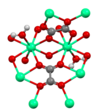옥살산 칼슘
화합물
옥살산칼슘(Calcium oxalate)은 화학식 CaC
2O
4을 갖는 옥살산의 칼슘염이다. 수화물 CaC
2O
4·nH
2O을 이루며 여기서 n은 1~3까지 다양하다. 무수 형태와 모든 수화물 형태가 무색이거나 백색이다.

| |

| |
| 이름 | |
|---|---|
| IUPAC 이름
Calcium oxalate
| |
| 식별자 | |
| |
3D 모델 (JSmol)
|
|
| ChEBI | |
| ChEMBL | |
| ChemSpider | |
| ECHA InfoCard | 100.008.419 |
| EC 번호 |
|
| KEGG | |
PubChem CID
|
|
| UNII |
|
CompTox Dashboard (EPA)
|
|
| |
| |
| 성질 | |
| CaC 2O 4 | |
| 몰 질량 | 128.096 g·mol−1 |
| 겉보기 | colourless or white crystals (anhydrous and hydrated forms) |
| 밀도 | 2.20 g/cm3, monohydrate[1] |
| 녹는점 | 200 °C (392 °F; 473 K) decomposes (monohydrate) |
| 0.61 mg/100 g H 2O (20 °C)[2] | |
용해도곱 (Ksp)
|
2.7 × 10−9 for CaC 2O 4[3] |
| 위험 | |
| 주요 위험 | Harmful, Irritant |
| GHS 그림문자 |  
|
| 신호어 | 경고 |
| H302, H312 | |
| P280 | |
| NFPA 704 (파이어 다이아몬드) | |
| 관련 화합물 | |
다른 음이온
|
Calcium carbonate Calcium acetate Calcium formate |
다른 양이온
|
Sodium oxalate Beryllium oxalate Magnesium oxalate Strontium oxalate Barium oxalate Radium oxalate Iron(II) oxalate Iron(III) oxalate |
관련 화합물
|
Oxalic acid |
달리 명시된 경우를 제외하면, 표준상태(25 °C [77 °F], 100 kPa)에서 물질의 정보가 제공됨.
| |
의학적 중요성
편집옥살산칼슘은 흡입 시 따끔거림과 마비를 유발할 수 있고 심지어는 치명적일 수 있다.
신장결석
편집신장결석의 약 76%가 부분적으로 또는 온전히 옥살산칼슘 유형이다.[4] 소변이 지속적으로 칼슘과 수산염으로 포화될 때 형성된다. 전 세계 1~15%의 사람들이 어느 시점에서 신장결석의 영향을 받는다.[5][6] 2015년, 이로 인해 전 세계적으로 약 16,000명의 사망자를 냈다.[7]
산업 분야
편집옥살산칼슘은 세라믹 유약(ceramic glaze) 제조에 사용된다.[8]
같이 보기
편집각주
편집- ↑ S. Deganello (1981). “The Structure of Whewellite, CaC2O4.H2O, at 328 K”. 《Acta Crystallogr. B》 37 (4): 826–829. doi:10.1107/S056774088100441X.
- ↑ Haynes, W., 편집. (2015–2016). 《Handbook of Chemistry and Physics》 96판. CRC Press. 4-55쪽.
- ↑ Euler. “Ksp Table: Solubility product constants near 25 °C”. 《chm.uri.edu》 (영어). 2021년 6월 10일에 확인함.
- ↑ Singh, Prince; Enders, Felicity T.; Vaughan, Lisa E.; Bergstralh, Eric J.; Knoedler, John J.; Krambeck, Amy E.; Lieske, John C.; Rule, Andrew D. (October 2015). “Stone Composition Among First-Time Symptomatic Kidney Stone Formers in the Community”. 《Mayo Clinic Proceedings》 90 (10): 1356–1365. doi:10.1016/j.mayocp.2015.07.016. PMC 4593754. PMID 26349951.
- ↑ Morgan, Monica S C; Pearle, Margaret S (2016). “Medical management of renal stones”. 《BMJ》 352: i52. doi:10.1136/bmj.i52. ISSN 1756-1833. PMID 26977089. S2CID 28313474.
- ↑ Abufaraj, Mohammad; Xu, Tianlin; Cao, Chao; Waldhoer, Thomas; Seitz, Christian; d'Andrea, David; Siyam, Abdelmuez; Tarawneh, Rand; Fajkovic, Harun; Schernhammer, Eva; Yang, Lin; Shariat, Shahrokh F. (2020년 9월 6일). “Prevalence and Trends in Kidney Stone Among Adults in the USA: Analyses of National Health and Nutrition Examination Survey 2007–2018 Data”. 《European Urology Focus》 (영어) 7 (6): 1468–1475. doi:10.1016/j.euf.2020.08.011. ISSN 2405-4569. PMID 32900675. S2CID 221572651.
- ↑ Vos T, Allen C, Arora M, Barber RM, Bhutta ZA, Brown A, 외. (GBD 2015 Disease and Injury Incidence and Prevalence Collaborators) (October 2016). “Global, regional, and national life expectancy, all-cause mortality, and cause-specific mortality for 249 causes of death, 1980–2015: a systematic analysis for the Global Burden of Disease Study 2015”. 《Lancet》 388 (10053): 1459–1544. doi:10.1016/s0140-6736(16)31012-1. PMC 5388903. PMID 27733281.
- ↑ “Calcium Oxalate Data Sheet”. Hummel Croton Inc. 2017년 4월 23일에 확인함.
